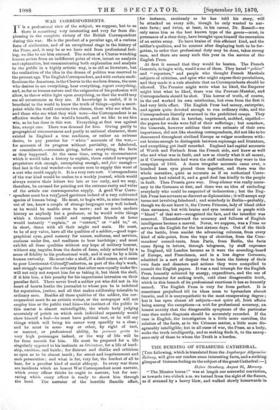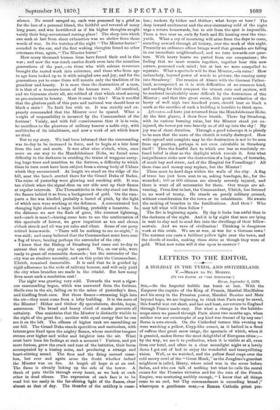THE BURNING OF STRASBURG CATHEDRAL. gm; following, which is translated
from the Augsburger Allgemeine- Zeitung, will give our readers some interesting facts, and a striking glimpse of German feeling on the subject of the great Cathedral :-1 Before Strasburg, August 25, Morning. "The Minster burns !" was at length our sorrowful conviction, as towards two o'clock a.m. we turned from the sight of the flames, as if stunned by a heavy blow, and walked slowly homewards in
silence. No sound escaped us, each was possessed by a grief,as for the loss of a personal friend, the faithful and revered of many long years, and was bewildered as if his higher thoughts sought vainly their long-accustomed resting-place ! The sleep into which one sank at last from sheer exhaustion was no shelter from those words of woe. In the watches of the night " The Minster burns !" sounded in the ear, and the first waking thoughts found no other utterance than, again, " The Minster burns! "
How many thousand human lives have found their end in this war ; and now the war-torch carries death even into the countless generations of the past,—to those who with solemn reverence brought the sacred work into existence, and those who from age to age have looked up to it with mingled awe and joy, and for the generations yet to come there will remain only the tradition of its grandeur and beauty. It is more than the destruction of a man, it is that of a treasure-house of the human race. All mankind, and we Germans above all, are robbed of that which stood among us pre-eminent in beauty. Must it come to this? Was it needful that the glorious path of this pure and national war should bear so black a stain ? No fault lies with us. It was strictly and ex-
pressly commanded that the Minster must be spared. What a weight of responsibility is incurred by the Commandant of the
fortress! Vainly, and with full consciousness that it is in vain, he sacrifices to the phantom of military honour a noble city, with multitudes of its inhabitants, and now a work of art which knew no rival.
But to my story. We had been informed that the cannonading was to-day to be increased in force, and to begin at a late hour from the east and south. It was after nine o'clock, when, once more on our way to the Mundolsheimer Hobe, we found some difficulty in the darkness in avoiding the trains of waggons carry- ing huge trees and munition to the fortress, a difficulty to which these in turn must have been subject from a strong body of Uhlans which they encountered. At length we stood on the ridge of the bill, near the bench erected there for the Grand Duke of Baden. The ruins of yesterday were glowing and smoking still. It was ten o'clock when the signal-fires on our side sent up their flames at regular intervals. The Thomaskirche in the city stood out from the flames behind it as from a background of gold. On the ram- parts a fire was kindled, probably a barrel of pitch, by the light of which men were working at the defences. A concentrated but changing light showed a large building, probably a lazaretto. In the distance we saw the flash of guns, like summer lightning, and—such is man !—having come here to see the continuation of this spectacle of horror, we grew impatient as ten and eleven o'clock struck and all was yet calm and silent. Some of our party retired homewards. "There will be nothing to see to-night," it was said ; and many believed that the Commandant must have sent a flag of truce, bearing perhaps the surrender of the city.
I knew that the Bishop of Strasburg had come out to-day to entreat that the city might be spared. We, on our side, were ready to grant all reasonable demands ; but the surrender of the city was an absolute necessity, and on this point the Commandant, Uhrich, remained immovable. It is said that he is guided by rigid adherence to the code of military honour, and will only yield the city when breaches are made in the citadel. But how many lives must such a resolution cost !
The night was growing very cold. Towards the west a vigor- ous cannonading began, which was answered from the fortress.
Shells rose in the air, falling on to the ashes of yesterday's fires, and kindling fresh ones. But those flames—streaming high into the air—they must come from a lofty building. It is the nave of the Minster ! Hither and thither .fly speculations, doubts, hopes, assurances. The broad and heavy cloud of smoke prevents all ceitainty. One maintains that the Minster is distinctly visible to the right of the great fire ; another with equal energy that he can see it on the left. The officers of higher rank are assembling on our hill. The Grand Duke stands speechless and motionless, with intense gaze fixed upon the mighty flames, whose merciless tongues stream ever higher and wider and brighter into the air. What must have been his feelings at such a moment ? Furious, and yet more furious, grow the crack and roar of the batteries, their boom accompanied by a hissing noise, and producing a strange and heart-stirring sound. The fires and the firing seemed cease- less, but ever and again arose the doubt whether indeed the Minster was on fire. At length all hope is at an end. The flame is already licking up the Bide of the tower. A throb of pain thrills through every heart, as we look at each other in dead silence. The expression of each face is to be, read but too easily in the far-shining light of the flames, clear almost as that of day. The thunder of the artillery is cease- less ; rockets fly hither and thither ; what keeps us here ? The deep inward excitement and the ever-increasing cold of the night urge a return homewards, but to stir from the spot is impossible.
From a tree near us, owls fly forth and flit hooting over the vine- yards. What a cry of mourning will arise from the days to come, sounding onward through all history, over the work of this night.
Presently an ordnance officer brings word that grenades are falling in our immediate neighbourhood, and we turn towards our quar- ters. With heavy hearts we parted from our companions ; the
feeling that we must remain together, together bear this new sorrow, possessed each mind ; but at last we were compelled to separate. What a spectacle will be that Minster,—in ruins ! How
melancholy, beyond power of words to picture, the coming entry into Strasburg ! The reunion of Alsace with the Germaii Father- land, accompanied as it is with difficulties of no common kind, and needing for their conquest the utmost care and caution, will be rendered incalculably more difficult by the destruction of this Minster ; and that this great event, this great restitution of the booty of well nigh two hundred years, should bear so black a mark as the sacrifice of such a building is horrible to think upon.
Afternoon.—I have just returned from the M.undolsheimer Hobe. At the first glance, I drew freer breath. There lay Strasburg, with its various burning ruins, but the Mister stood yet un- injured, the tower yet rose bravely as of old up into the sky ! My joy was of short duration. Through a good telescope it is plainly to be seen that the nave of the church is totally destroyed. How wide-spread and complete may be the destruction is not to be seen from my position, perhaps is not even calculable in Strasburg
itself ! Thus the fearful fact to which one has so resolutely re- fused belief is clear as the daylight which reveals it. Into what insignificance sinks now the destruction of a hop-store, of barracks, of much hay and straw, and of the Hospital for Foundlings ? All these time and money may replace, but the Minster
These must be hard days within the walls of the city. A flag of truce has just been sent to us, asking bandages, &c., for the wounded ; 500 or 600 citizens are already severely injured, and there is want of all necessaries for them. Our troops are ad- vancing. From first to last, the Commandant, Uhrich, has listened to no word of treaty. He stands on purely military ground, without consideration for the town or its inhabitants. He awaits the making of breaches in the fortifications. And then ? Who may tell what will then follow ?
The fire is beginning again. By day it looks less awful than in the darkness of the night. And it is by night that men aro lying in wait to slay and to send fire into the dwellings of their fellow- mortals. And we rave of civilization! Thinking is dangerous work at this crisis. We are at war, at war for a German town ! The autumn sun casts a brilliant yellow light over the town, and the clouds of smoke, making them shine as though they were of gold. What new ruins will it rise upon to-morrow?































 Previous page
Previous page